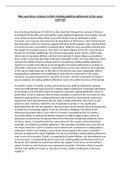Why was there a failure to find a lasting political settlement in the years
1649-60?
From the Rump Parliament of 1649-53 to the chaos that followed the removal of Richard
Cromwell from the office of Lord Protector, many political settlements were trialled, and yet
none of them proved lasting. While much of the blame must be attributed to Oliver
Cromwell, as he oversaw each step from the dissolution of the Rump in 1653 until his death,
the rapid failure of his son, Richard, suggests that other factors played a role, and that Oliver
Cromwell may have succeeded in containing them. While the army provided Cromwell with
the support he needed to govern, they were not always aligned and so the army became a
burden for Cromwell. Additionally, the natural conservatism of the country, which made
reform and co-operation difficult, and the recent growth of radical religious and political
ideas made a universally agreeable settlement impossible to find. One way which one could
measure the relative impacts of these factors in preventing a lasting political settlement
could be to consider their effects on the dissolution of feasible settlements or creation of
unfeasible settlements. For instance, Cromwell must receive some blame for his instigation
of the rule by Major-Generals, as this form of Martial Law was never sustainable. While a
lasting political settlement was established in 1660 with the restoration of the Stuart
monarchy, the period between the execution of Charles I and the restoration of Charles II
saw no evidence of a lasting political settlement, hence, this will be the focus of the period.
Cromwell’s regime of rapidly creating and dissolving new political settlements between
1653 and 1658 left little opportunity for a lasting political settlement. Cromwell’s dissolution
of the Rump in 1653 directly shows his intention to prevent a lasting settlement. Since his
justification is that he believed that the Rump intended to extend its life, Cromwell not only
killed this opportunity for a lasting settlement, but he did it for that purpose. Some have
argued that the Rump Parliament was not really a stable settlement, due to the 51 acts
passed in 1652. However, while this rate of legislation was high, it was significantly
diminished from the 125 acts passed in 1649 and hence shows that the Rump was beginning
to settle into a sustainable regime, if not for Cromwell’s meddling. The failure of the
Nominated Assembly within a year reflects Cromwell’s destabilising effect on politics.
Cromwell’s failure to understand that the freedom of radical religious ideas, which he
advocated, would prevent this government of the holy from functioning cohesively, led to
its failure. Hence, Cromwell should face some blame for the creation of the Nominated
Assembly, as it failed as a political settlement. The imposition of Martial Law in the form of
the Major-Generals in 1654-55 shows a lack of desire from Cromwell for a lasting political
settlement. Rather than seeking a system which would appease the nation, Cromwell’s
decision to suppress the nation highlights his role in preventing a lasting political settlement,
since it was not his priority. Finally, in accepting the Humble Petition, and advocating his son
as his successor, Cromwell hindered the search for a lasting political settlement even from
the grave. Since Richard Cromwell had neither the support of the army, nor the political
nation, his stint as Lord Protector was contained to 8 months. Therefore, Oliver Cromwell
had the most significant impact on the failure to find a political settlement, as he never
sought it.





